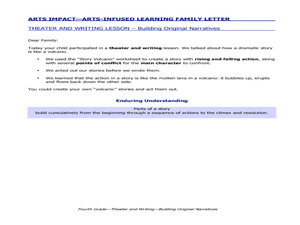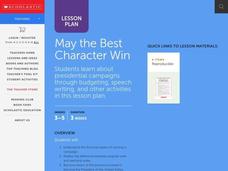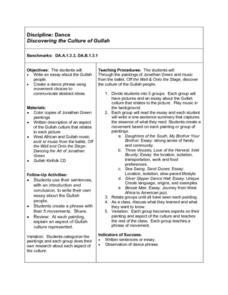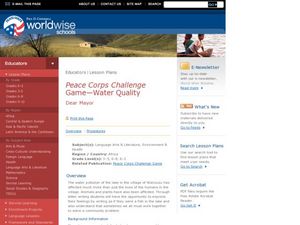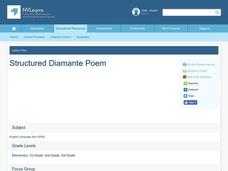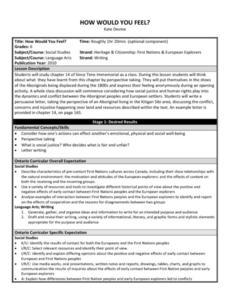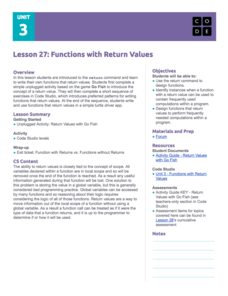Curated OER
Double Jeopardy-Homophones
Second graders identify homophones as words that sound alike but have different meanings. They, given a pair of homophones, are to explain the meanings of the words using gestures, role playing, or drawing a picture with their partner.
BBC
The Patchworker - Sentences Making Sense
An entertaining and educationally sound lesson on sentence structure is here for you. Young readers play an online game called "The Patchwork Game" where they must patch together a series of words in order to create a complete sentence....
BBC
Starship English and Math - Online Lesson Plans
Two online lessons, one in math and one in language arts, are here for you. In them, learners play online games which reinforce important skills in literacy and numeracy. The thing I like about both of these lessons is that they get the...
Curated OER
Simple Inequalities
Learners solve inequalities. In this inequalities instructional activity, students evaluate simple inequalities. They examine vocabulary words. Learners participate in breath holding activities and write inequalities to represent the...
Curated OER
Let's Learn About Plants!
Students discover different plants and plant parts by observing their campus. In this plant life lesson, students take a guided walk around their school with a magnifying glass examining everyday plants as well as photographing...
Curated OER
Synonyms and Antonyms
Mix up your writing lessons by having kids look at recent newspaper articles instead of their own work. They work in pairs and rewrite sports news articles using synonyms and antonyms for a set number of words. Then they share their work...
Curated OER
Building Original Narratives
Fourth graders act out and write original narratives. In this theater meets writing lesson plan, 4th graders work in groups to create original narratives; after students act out their story, they write it down as a narrative.
Japan Society
Changing Times, Changing Styles: New Japanese Literary Styles of the Late Nineteenth Century
Focusing on Doppo's "Unforgettable People" and late nineteenth century Japanese literature, this resource also leads to discussions of form being dictated by content. Explore the development of new literary styles first-hand by...
Google
Advanced 4: Searching for Evidence for Research Tasks
Research was very different in the past. Pupils once had difficulty finding sufficient information, but now they have the opposite problem. Show your class how to pick the best resources out of the millions of sites an online search will...
BBC
The Sound Monster - Words That Make Sounds
There are words in the English language that actually make sounds, such as vroom, and, buzz. Here is a clever lesson which introduces young readers to these sound-making words. They play an interactive game on the computer that has...
Curated OER
May the Best Character Win
Running an election campaign takes money. Class groups must effectively budget money in order to design and purchase sufficient advertising aimed at procuring classmates' votes. After completing an online tutorial, they also write and...
Curated OER
Dance: Discovering the Culture of Gullah
It's wonderful to see a lesson that incorporates art, movement, and writing. These three forms of creative expression are explored as learners dance to music from the Gullah people of West Africa. They analyze several paintings, listen...
Curated OER
Nurture Poetry
Young scholars create a poetry book. In this poetry lesson, students write a cinquain poem, name poem, haiku, limerick, and preposition poem.
Curated OER
Mythology: Reader's Theater
Build reading fluency and classroom community with a Reader’s Theater activity. Class groups select a myth, or if part of a myth writing unit, select a group member’s myth, craft a script, and perform for the class. Directions for...
Code.org
Processing Arrays
Scholars use a playing card activity to help them develop a program to find the minimum value of a list. They learn to use for loops to write code that will process lists.
Curated OER
A Second Visit To Old Sturbridge Village-The Story Tour
Students conduct research on 1830s families and early New England culture. They conduct research on the Old Sturbridge Village website, participate in an online chat with a costumed interpreter, and continue to develop possible plots to...
Curated OER
Moore vs. Livingston:Who Really Wrote 'The Night Before Christmas'
Students research an author and gather information that seems to support that person as author of The Night Before Christmas. They work in groups to gather the most solid evidence and they write a persuasive essay presenting their argument.
Curated OER
Telling Time Lesson Plan
Judy Clocks are a great invention. Here, learners review telling time to hour and half hour on Judy clocks, begin telling time to quarter hour, use clock stamps to practice, and play computer games using Trudy's Time and Place House...
Curated OER
Kindergarten/First Grade Phonics
Get involved with phonics by recognizing one particular letter. Learners name a letter, know it by sound, decode basic CVC words and use the letter in writing. A variety of options are given to the your learners: making a letter collage,...
Curated OER
Peace Corps Challenge Game- Water Quality
Students advocate for clean water. In this water pollution lesson, students play the Peace Corps Challenge Game, discuss the effects of polluted water and write a letter to the mayor of Wanzuzu highlighting the situation of the...
Curated OER
Color My World Grey and Blue
Can colors help to convey a mood in writing? Explore this question with your class using the songs "Grey Street" by the Dave Matthews Band and "Blu is a Mood" by Blu Cantrell. After analyzing the effect of the color words in these songs...
Curated OER
Structured Diamante Poem
Youngsters review nouns, adjectives and verbs. In this poetry lesson plan, readers choose a set of antonyms and create a list of synonyms, verbs and adjective for each. Students use the words to write a Diamante poem.
Curated OER
How Would You Feel?
Sixth graders put themselves in the shoes of aborigines who were displaced from their homes in the 1800s by Europeans who came in and took their land from them. They discuss the social injustices suffered by these people, and write...
Code.org
Functions with Return Values
Young computer scientists explore how to use the return command in computer programing by playing Go Fish. They learn about functions that return values and then write a turtle driver app using the return function.
Other popular searches
- Creative Writing Plays
- Writing Plays Year 6
- Writing Plays English
- Writing Plays for Books
- Writing Plays Folktales
- Writing Plays Format
- Writing Plays Shakespeare
- Writing Plays With Puppets
- Writing Plays From Novels
- Playscript Writing
- Writing Playscripts






